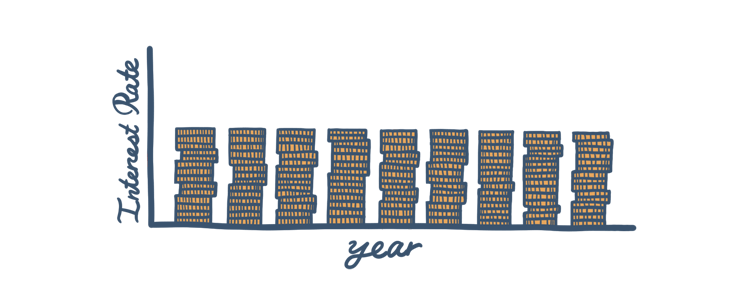Fixed Rate Mortgage

As the name would suggest, the interest rate on a fixed rate mortgage stays the same throughout the life of the loan, and consequently, so do the minimum monthly payments.
The FHA’s fixed rate mortgages are a popular option for many homebuyers as they come with the same flexible guidelines as other FHA programs, namely the 3.5% down payment requirement and 580 minimum credit score. The fixed rate mortgages have either 15 or 30-year terms. While 30-year terms are the most popular, 15-year fixed rate mortgages typically have lower interest rates with higher monthly payments, but more of the money goes toward the principal every month.
Eligibility
In order to qualify for an FHA fixed rate mortgages, it’s important you know the basic requirements:
- Your debt-to-income ratio must fall at or under the FHA’s maximum qualifying ratio of 43%.
- You must have a credit score of at least 500.
- You qualify for a 3.5% down payment if your credit score is 580 or higher, or a 10% down payment if your credit score is between 500-579.
- The house you buy must be a 1- to 4-unit structure that serves as your primary residence and meets the FHA’s minimum property requirements.
The Pros
A fixed rate loan can be a surefire choice for many borrowers because of the certainty it comes with.
- A fixed rate loan means no surprises. You know exactly what your monthly payment is going to be for the life of the loan, making it easier for you to budget your income.
- Borrowers with fixed rate mortgages are protected from the uncertainty of a fluctuating market. Even if interest rates skyrocket, your rate is locked in for the entire term.
- The fixed rates make it easier to shop around for loans, because you can simply calculate your monthly payments and make the best choice.
The Cons
The inflexibility of fixed rate mortgages may not work out for all homebuyers.
- With fixed rate loans, timing can work against you. You may feel you’re getting a low rate at closing time, but a few months down the line the rates may drop further.
- Refinancing for a lower rate may be expensive and ultimately cost you more in the long run.
- Fixed rate mortgages generally have higher interest rates than ARMs, and if you end up selling or refinancing in the first few years, your interest payments would have to be higher.

FHA Loan Articles
September 8, 2023Borrowers considering an FHA loan should be familiar with some basic loan terminology. These loans are popular among first-time homebuyers and those with lower credit scores because they often offer more flexible eligibility requirements and lower down payment options.
September 2, 2023You may have heard the terms co-borrower and cosigner in connection with your FHA loan process, but aren't sure about the distinction. Both a co-borrower and a cosigner can help a primary borrower qualify for a mortgage, but they have different roles and responsibilities.
August 27, 2023The Federal Housing Administration has specific credit requirements and guidelines for borrowers looking to buy or refinance homes with an FHA loan. In addition to what FHA guidelines state, lenders may have more stringent requirements that may vary from one lender to another.
August 23, 2023Mortgage APR (Annual Percentage Rate) and a loan's interest rate are two different things, although they are closely related. Understanding the difference is an important part of a borrower's analysis of the true cost of their mortgage.
August 19, 2023FHA refinance loans allow homeowners with existing FHA loans to refinance their mortgages. These loans are designed to help borrowers take advantage of lower interest rates, reduce their monthly mortgage payments, or access equity in their homes for various purposes.
August 14, 2023FHA loans typically require a minimum down payment of 3.5% of the purchase price of the home with the right credit score. This means that if you're buying a house for $240,000, you would need to make a down payment of at least $8,400.








